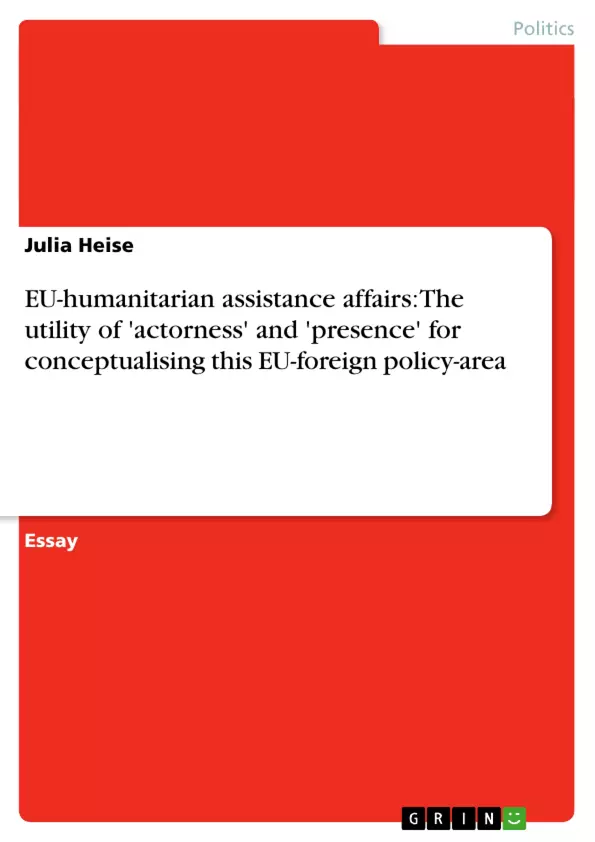The EU plays a multiplicity of roles in a range of policy areas in the international system1 and the global context is increasingly seen as the stage on which the Union must act.2 However, the EU is not a traditional global actor -it has a rather distinctive and unique international identity due to its institutional structure and decision- making procedures. Several theories have attempted to grasp this unique identity and are concerned with the question of how significant a global actor the Union is. The following paper assesses the utility of two specific theories- “actorness” and “presence”- for conceptualising the role of the EU in one particular foreign policy-area- humanitarian assistance affairs.3 Section one examines how the concept of “actorness” can be applied to the policy-area of humanitarian assistance and evaluates the result of this analysis. The same method is used in section two that discusses the concept of “presence”. The essay concludes by comparing and reflecting on the overall utility of the two concepts. 1 Bretherton and Vogler, 1999: 15. These EU-foreign policy areas mainly include trade relations, security and defence issues, development affairs, environmental issues and humanitarian assistance. The role of the EU varies from area to area. 2 Cremona, 2004: 553. 3 Humanitarian assistance affairs fall under the portfolio of the Development-Commissioner. However, it has to be emphasized at this point that this essay exclusively deals with humanitarian assistance. On development affairs for example see Holland (2004), Santiso (2002), Brenton (2003), Grilli (1993), Babarinde/Faber (2004) and Pernice/Thym (2002).
Inhaltsverzeichnis (Table of Contents)
- The concept of "Actorness"
- The "Presence"-model
- Conclusion
Zielsetzung und Themenschwerpunkte (Objectives and Key Themes)
This paper aims to assess the utility of two theories, "actorness" and "presence," in conceptualizing the European Union's (EU) role in humanitarian assistance affairs. The paper examines how these concepts apply to the EU's involvement in this specific foreign policy area and evaluates the results of this analysis.
- The concept of "actorness" and its application to EU humanitarian assistance
- The concept of "presence" and its application to EU humanitarian assistance
- The EU's role in international affairs and its unique identity
- The significance of the EU as a global actor
- The EU's legal and institutional framework for humanitarian assistance
Zusammenfassung der Kapitel (Chapter Summaries)
- Chapter 1: This chapter explores the concept of "actorness" as a framework for assessing the EU's significance as a global actor. It examines the four criteria of Recognition, Authority, Autonomy, and Cohesion, and how these apply to the EU's role in humanitarian assistance. The chapter analyzes the EU's involvement in this area and evaluates the extent to which it meets these criteria.
- Chapter 2: This chapter focuses on the "presence" model and its relevance to understanding the EU's humanitarian assistance activities. It explores the concept of "presence" and its implications for the EU's role in this field. The chapter examines the EU's engagement in humanitarian assistance and assesses the extent to which it exhibits "presence" according to the chosen framework.
Schlüsselwörter (Keywords)
This paper focuses on key concepts such as "actorness," "presence," humanitarian assistance, EU foreign policy, global actor, institutional framework, and the role of the European Union in international affairs. It explores the EU's unique identity, its legal competence, and the significance of its humanitarian aid activities in the global context.
Frequently Asked Questions
What is the difference between "actorness" and "presence" in EU foreign policy?
"Actorness" focuses on the EU's capacity to act based on criteria like authority and autonomy, while "presence" refers to the EU's influence and visibility in the international system regardless of formal action.
How does the concept of "actorness" apply to humanitarian assistance?
It evaluates the EU's significance based on four criteria: Recognition, Authority, Autonomy, and Cohesion within the specific policy area of humanitarian aid.
Why is the EU considered a unique international actor?
The EU has a distinctive international identity due to its complex institutional structure and decision-making procedures, which differ from traditional nation-states.
What are the legal competencies of the EU in humanitarian aid?
The paper examines the EU's legal and institutional framework, noting that while it falls under the Development-Commissioner's portfolio, it is treated as a distinct foreign policy area.
What is the utility of these theories for understanding the EU?
These concepts help conceptualize how significant a global actor the Union is and provide a framework for analyzing its multiplicity of roles in international affairs.
- Citation du texte
- Julia Heise (Auteur), 2005, EU-humanitarian assistance affairs: The utility of 'actorness' and 'presence' for conceptualising this EU-foreign policy-area, Munich, GRIN Verlag, https://www.grin.com/document/39095



